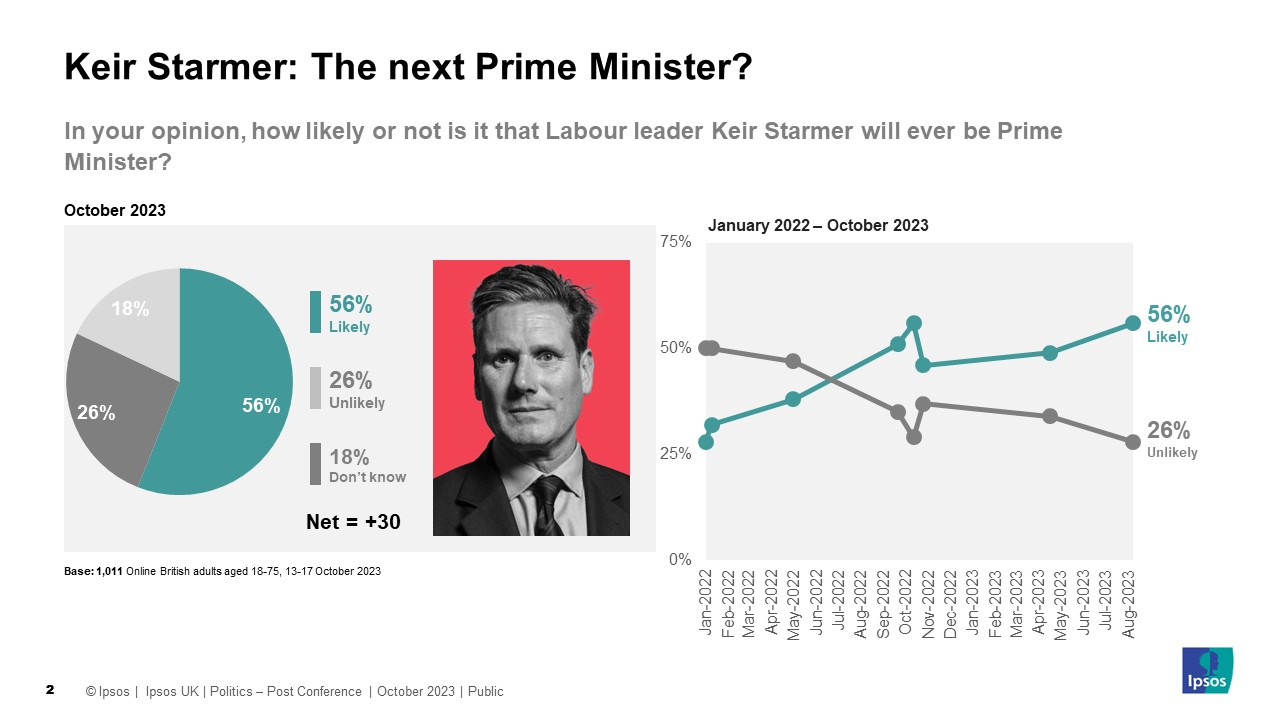Majority think Starmer will become Prime Minister, as only one in five think Sunak will win next election
New polling from Ipsos shows half (56%) the public think it is likely that Keir Starmer will become Prime Minister. Only one in four (26%) say the opposite. These latest numbers show even a majority (51%) of 2019 Conservative voters are predicting that Keir Starmer will enter Number 10.
Fieldwork was conducted between 13-17 October 2023, after party conferences but before by-elections which were held on the 19th October.

This comes as two in five (37%) say Keir Starmer has changed the Labour party for the better since becoming leader. Although the same proportion say he has not made a difference (37%), and 16% say he has changed it for the worse.
In comparison, just one in five (22%) say it is likely that Rishi Sunak will win the next General Election. Over three in five (63%) say it is unlikely.
Confidence in Mr Sunak’s electoral ability is now at its lowest point since he became Prime Minister, having slipped from 27% saying he would likely win the next election a year ago. His numbers are still ahead of Liz Truss’ from October 2023 when just 13% thought she could win, but behind one in three (30%) who still plumped for Boris Johnson in June 2022.
Since taking over as Conservative leader, two in five (41%) say Rishi Sunak has made no difference to his party, while three in ten (30%) think he has changed it for the worse and one in five (20%) for the better.
Views of the Party Conferences
Just over a third say they closely followed either the Conservative or Labour party conferences (both 36%). However, the public tend to think the Labour party’s went better for Keir Starmer than the Conservative’s went for Rishi Sunak.
Two in five (39%) think the Labour party conference went well for Keir Starmer, against just 15% saying badly. This an improvement from 2021, when fewer than one in five (19%) thought the conference that year went well for the Labour leader.
Although, it is worth noting that positivity towards Labour party conference is mainly being driven by 2019 Labour voters, where three in five (61%) say it went well. 2019 Conservative voters are more in the line with the public as a whole, with two in five (37%) believing it went well.
One in three (32%) think the Conservative party conference went badly for Rishi Sunak, against one in five (21%) who think it went well. These numbers are slightly worse than Boris Johnson received after his 2021 conference, when one in four (25%) thought it went well.
Around three in ten say that Keir Starmer’s speech left them with a positive impression of both him (29%) and the Labour party (30%). Whereas, two in five say Rishi Sunak’s speech left them with a negative impression of him (41%) and the Conservative party (42%). Again, positivity towards Labour is mainly driven by their own voters.
Gideon Skinner, Head of Politics Research at Ipsos in the UK, says of the findings:
While relatively few say they paid attention to party conferences, it’s clear that coming out of them, the momentum remains with Keir Starmer, as the public are starting to envisage him in Downing Street. Although there are signs that he still has to do more to win over 2019 Conservative voters. Nevertheless, Sunak was reported to want to use his party conference as a 'reset' and will be disappointed that instead confidence in his ability to win the next election has slipped to its lowest ebb since he became Prime Minister.
Technical note
Ipsos interviewed a representative sample of 1,061 GB adults aged 18+. Interviews were conducted online from 13-17 October 2023. Data are weighted to match the profile of the population. All polls are subject to a wide range of potential sources of error.





